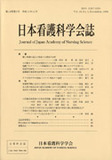Japanese
English
- 販売していません
- Abstract 文献概要
- 参考文献 Reference
- サイト内被引用 Cited by
要約
本研究の目的は,1)親のライフスタイルを,日常生活習慣,健康責任,自己実現,ストレスとストレス管理,子育てに関する態度に焦点をあて,それらの関連を調べること,2)患児の日常生活習慣および療養行動と親のライフスタイルとの関連を調べることである.対象は,外来受診中の6~18歳の小児糖尿病患者46名と,付き添いで来院した親(母親42名,父親4名)であった.患児には日常生活習慣と療養行動に関する2種類の質問紙調査を行い,その親には日常生活習慣,健康責任,自己実現,日常のいらだち事,ストレス管理,子育てに関するpositiveな態度と,negativeな態度,および疾患関連ストレスの8カテゴリーから成るライフスタイルについての質問紙調査を行った.
その結果,1)親の健康責任と自己実現,ストレス管理,および,子育てpositiveと自己実現,ストレス管理には相関がみられた.2)親が「朝すっきり起きられる」ことは,親のライフスタイルのカテゴリーの多くと相関が見られた.3)患児の日常生活習慣は,親の日常生活習慣の「就寝時間」「歯磨き」のみと相関がみられた.4)患児の療養行動が適切なことは,親の自己実現が高いこと,疾患関連ストレスが少ないこと,子育てがnegativeでないこと,「朝すっきり起きられる」「就寝時間」「外出後の手洗い」と相関がみられた.
結果より,①親が自分の健康に関心を向け,子育てを楽しんだり,子どものよい面に目を向けられるように働きかけること,②ストレスが高い親,特に患児の療養行動が不適切な親に対し,親のストレスを緩和し,子どもに支持的に関われるような看護援助を行うこと,③親の就寝時間や清潔行動など実際の行動を適切にすることで,患児がモデルとして取り込めるようにする看護援助が大切であると考えられた.
Abstract
The purposes of this study were: 1) to investigate the lifestyle of parents with diabetic children, and 2) to explore the relationships between diabetic children's health habits, self-care behaviors, and the lifestyle of their parents.
The subjects were 46 pairs of diabetic children aged 6 to 18 and their parents (42 mothers and 4 fathers) in three pediatric diabetic clinics. Diabetic children completed two questionnaires regarding health habits and self-care behaviors. Their parents completed a questionnaire regarding lifestyle which consisted of 8 categories of health habits, health responsibilities, self-actualization, daily hassles, stress management, positive and negative parenting attitudes, and disease-related stresses.
Significant correlations were found between parent's health responsibilities and self-actualization, health responsibilities and stress management, positive parenting attitudes and self-actualization, and positive parenting attitudes and stress management. Those parents who“wake up bright and fresh”correlated with several categories of parents' lifestyles. A total score of health habits of diabetic children was correlated with parents' bedtime and tooth brushing. Good self-care behaviors of diabetic children were related to parents' high self-actualization, low disease-related stresses, positive parenting attitudes, waking up bright and fresh, bedtime and hand washing after coming home.
The findings of this study suggested that nursing interventions for parents of diabetic children would be: 1) to increase attention to their own health and positive parenting attitudes to diabetic children, 2) to decrease daily hassles and disease related stresses, 3) to improve bedtime and hygienic behaviors which could be a life model for their children.
Copyright © 1999, Japan Academy of Nursing Science. All rights reserved.


